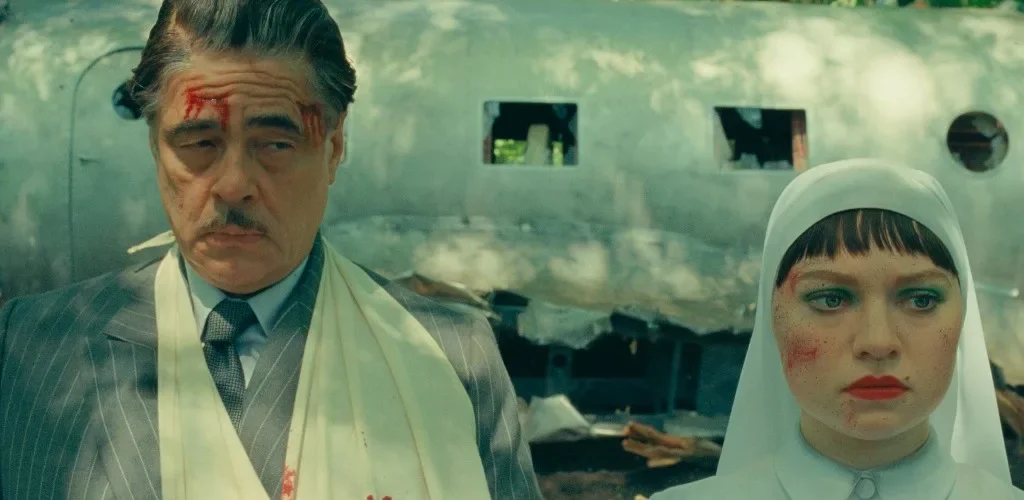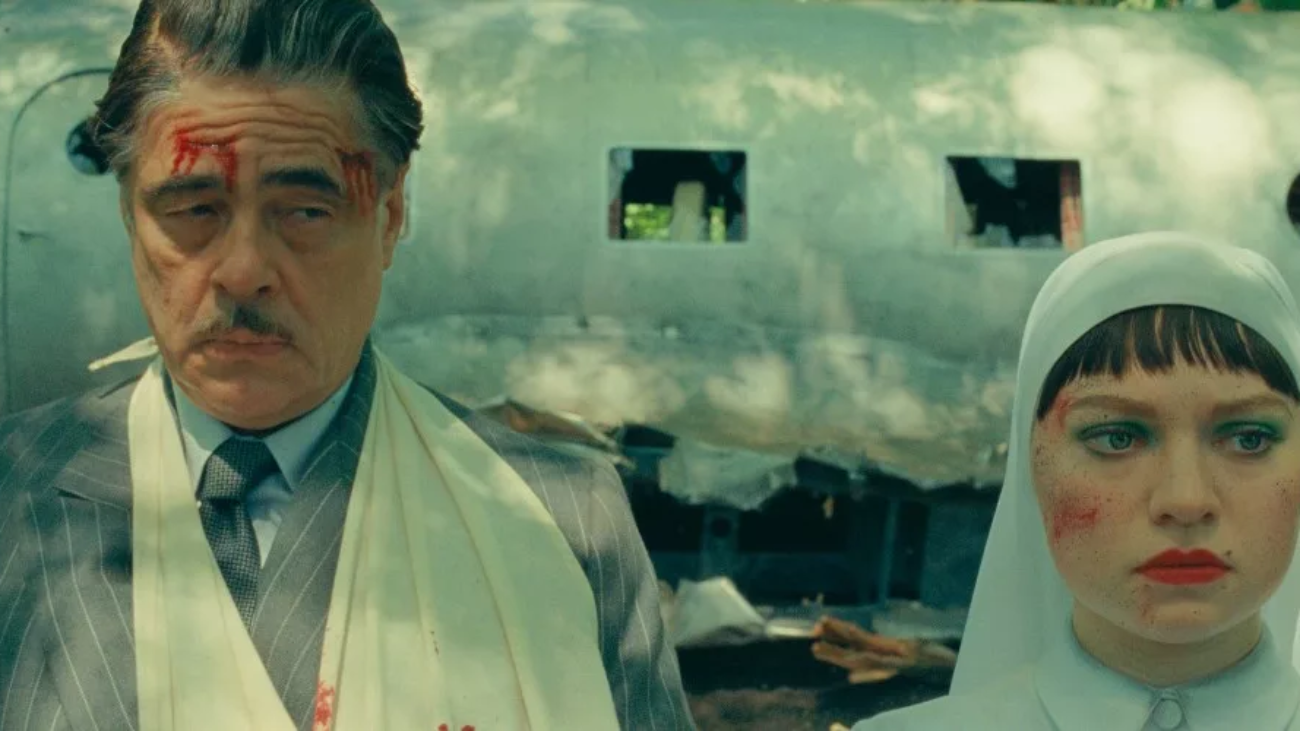
The Phoenician Scheme by Wes Anderson starts as an absurdist sketch before transforming into a profound narrative about legacy and redemption through bureaucratic struggles. The film presents Wes Anderson at his most whimsical with an abundance of visual humor and symmetrical design elements. Under its candy-colored exterior this film presents a man’s journey to reconcile his power and understand true goodness following his ruthless pursuit of ambition.
While The Phoenician Scheme does not reach the depth of Asteroid City or The French Dispatch it remains consistently engaging and touches upon profound themes. Michael Cera’s career-best performance alongside a deeply stacked ensemble cast transforms this gleefully absurd ride into something more thoughtful than its initial appearance suggests.
The movie title A Businessman in Crisis (and in the Clouds) sets the scene.
We open with a bang. Quite literally. Within the first five minutes of the film we learn that Zsa-zsa Korda (played by Benicio del Toro), a mythical businessman with cat-like reflexes, escapes his sixth plane crash injury free. The crash is staged with deadpan physical comedy: The plane crash shows a man who splits into two halves while the pilot exits mid-flight then loses his job in the process while Korda miraculously escapes injury once more. The message is clear: Death continues to pursue Korda yet he remains relentless in his plans.
The rising danger of assassination forces Korda to take action and designate his successor. His decision to adopt multiple sons stems from his belief that one might prove to be a genius which serves as a funny approach to succession planning through the law of large numbers. Korda chooses to groom his daughter Liesl (Mia Threapleton), who is both a nun and possesses a strong moral compass. She will join him for a fast-paced journey through secret negotiations as well as spiritual and moral discoveries.
A Cast of Characters (And Then Some)
The plot feels thin because that happens to be its actual condition. The enjoyment of Wes Anderson films emerges from the character-driven journey rather than the final outcome. The journey introduces us to countless vibrant characters.
The royal character of Prince Farouk portrayed by Riz Ahmed functions as a skeptical financier.
Mathieu Amalric portrays Marseille Bob who owns a nightclub yet operates with unclear ethics.
Marty & Hilda are played by Jeffrey Wright and Scarlett Johansson who portray an American cousin and his strategic partner.
Uncle Nubar (Benedict Cumberbatch) resembles a crazed czar who might reside within a museum.
Bill Murray embodies God himself in a brief but divine appearance in the film.
Michael Cera delivers a standout performance as an awkward tutor who holds a mysterious past. In Anderson’s world Cera appears to be a perfect match because he provides his lines with deadpan accuracy while gracefully handling slapstick and giving his character an air of silent sadness. Anderson’s filmography contains many memorable moments but none are funnier than Cera’s karate showdown.
Themes of Power, Mortality, and Missed Connections
The Phoenician Scheme functions as a screwball farce while exploring deep philosophical inquiries. Korda’s bold exterior and his credo to “flatten everything in your way” mask his deep struggle with an impending existential crisis. After surviving numerous assassination attempts throughout his life, each time Korda faces death the film transitions to surreal and biblical visions of Heaven where God (played by Murray) warns him that his place at the table remains uncertain.
Anderson has devised a clever strategy to explore the ethical shortcomings of wealthy elites while maintaining a non-preachy tone. Through shady labor practices and aggressive business takeovers Korda expanded his empire driven by pure ego. Facing the end of his days he attempts to construct a “righteous” deal which has yet to be clearly defined but he ensures it will not exploit child labor.
But what is the deal? Who’s funding what? What are the stakes? The film doesn’t really say. Through deliberate obfuscation of business details Anderson creates a haze that lets absurd meetings and theatrical negotiations become canvases for personal reflections. The film’s vague nature stands as both its advantages and disadvantages. The lack of specific details about business dealings enables the film to concentrate fully on its characters and central themes. The middle act loses momentum because of scenes that repeat the same narrative elements.
Faith, Family, and Forgiveness (Sort Of)
The most significant threat Korda faces comes from within himself rather than from those who seek his death. He wants to improve his fatherhood skills and become a better person along with potentially embracing religious faith. The story receives its emotional foundation through the bond between Korda and Liesl. Threapleton delivers Liesl with subtle conviction, while her performances alongside del Toro reveal seldom-seen qualities of vulnerability and hope within the actor.
Through their shared journey Anderson investigates how organizations such as religious bodies and corporate entities endeavor to establish moral standards yet frequently fall short. The nun Liesl makes her way through a realm dominated by powerbrokers and dealmakers. The mogul Korda spends his time exploring spiritual reflection in a casual manner. The film works best because each character seems slightly misplaced.
Anderson, Evolved
Stylistically, Anderson is still doing Anderson: Anderson utilizes pastel color schemes while arranging his sets with meticulous precision to create dead-center compositions and compose dialogue that flows as rhythmically as poetry. But there’s something looser here, too. The distinctive tone of Anderson’s work emerges from a balance between slapstick and soul while his unique style allows scenes to stretch awkwardly or reach abrupt conclusions. Anderson demonstrates an unprecedented readiness to mix authentic feelings with ridiculous elements in his latest work.
The Phoenician Scheme lacks the emotional intensity of The Royal Tenenbaums and the grand storytelling of The Grand Budapest Hotel yet delivers a distinct sense of personal reflection as the filmmaker explores the meaning of his work through time. This movie appears comedic on initial viewing but employs satire effectively by posing meaningful inquiries underneath its humor.
Final Verdict
The Phoenician Scheme fails to reach the pinnacle of Wes Anderson’s filmography. But it’s also far from forgettable. You discover its themes of mortality, faith, and legacy through subtle development. The film delivers its humorous moments successfully more frequently than it fails to do so. The film’s experience reaches new heights under the performances of Michael Cera and Benicio del Toro who deliver unexpected emotional depth.
Viewers seeking straightforward storytelling or a distinct message will likely feel frustrated by this film. When you embrace its unique pace which combines oddities and personal revelations with philosophical musings you will discover its profound value.
This Anderson film doesn’t stand out at first glance in his filmography yet remains in your thoughts well after the end credits.
Rating: ★★★★☆ (4/5)
The Phoenician Scheme will have its theatrical release on May 30.
It’s a wild ride—awkward, messy, beautiful. Just like redemption.



Leave A Comment